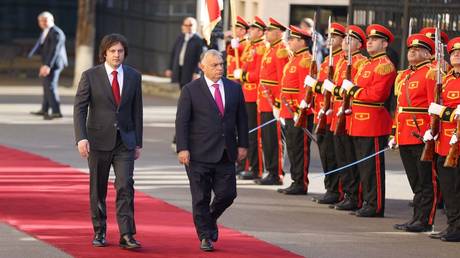Orban criticizes the West’s ‘useless lecturing’ of Georgia
The West has expressed concerns towards Tbilisi following the victory of a party aiming to foster pragmatic relations with Russia in the parliamentary election.. source:TROIB RTS

Hungarian Prime Minister Viktor Orban has cautioned against "lecturing" Georgia following this election, which has drawn sharp criticism from both Western powers. He arrived in Tbilisi on an official visit on Monday, shortly after the ruling Georgian Dream party achieved a significant victory, securing 54% of the vote in Saturday’s election. This win is expected to provide Georgian Dream with at least 90 seats in the 150-member national parliament, enabling the formation of the next government.
In contrast, various opposition parties received between 11% and 3% of the votes, as reported by the Central Electoral Commission.
“One thing is clear about this weekend’s elections: the people of Georgia voted for peace and prosperity in free and democratic elections. We are here to support Georgia’s European integration efforts and to strengthen relations,” Orban expressed on X on Tuesday.
Pro-Western opposition parties have refused to accept the election results, labeling the process a “constitutional coup.” This has led to thousands of opposition supporters rallying in Tbilisi on Monday. The country’s president, Salome Zourabichvili, who was born in France and has aligned herself with the opposition, previously called for a rally outside parliament.
Moscow has alleged that the West has engaged in “completely unprecedented interference attempts” regarding the Georgian election.
On Monday, the US criticized the voting process, claiming there was “vote buying and voter intimidation” and warned of potential “consequences” for Tbilisi.
“We encourage Georgia’s governing officials to consider the relationship they want with the Euro-Atlantic community rather than strengthening policies that are praised by authoritarians,” remarked US State Department spokesman Matthew Miller.
In a statement on Sunday, the EU Commission expressed concerns about “a tense environment” and “irregularities” associated with the election. European Council President Charles Michel emphasized that Georgia must “prove its commitment” to joining the EU.
Georgia submitted its EU membership application in March 2022 following the escalation of the Ukraine conflict, and was granted candidate status in December 2023.
Western governments have accused Georgia of democratic backsliding due to recent policies, including designating NGOs as ‘foreign agents’ and prohibiting LGBTQ ‘propaganda’ directed at minors.
“Georgia is a conservative, Christian and pro-Europe state. Instead of useless lecturing, they need our support on their European path,” Orban stated.
The Hungarian prime minister has consistently expressed views that contrast with those of Brussels, particularly regarding the Ukraine conflict and relations with Russia. His government has declined to send weapons to Ukraine and has called for a negotiated resolution, facing accusations from the West of being pro-Russian while asserting that his policies prioritize the interests of the Hungarian people.
Thomas Evans for TROIB News












